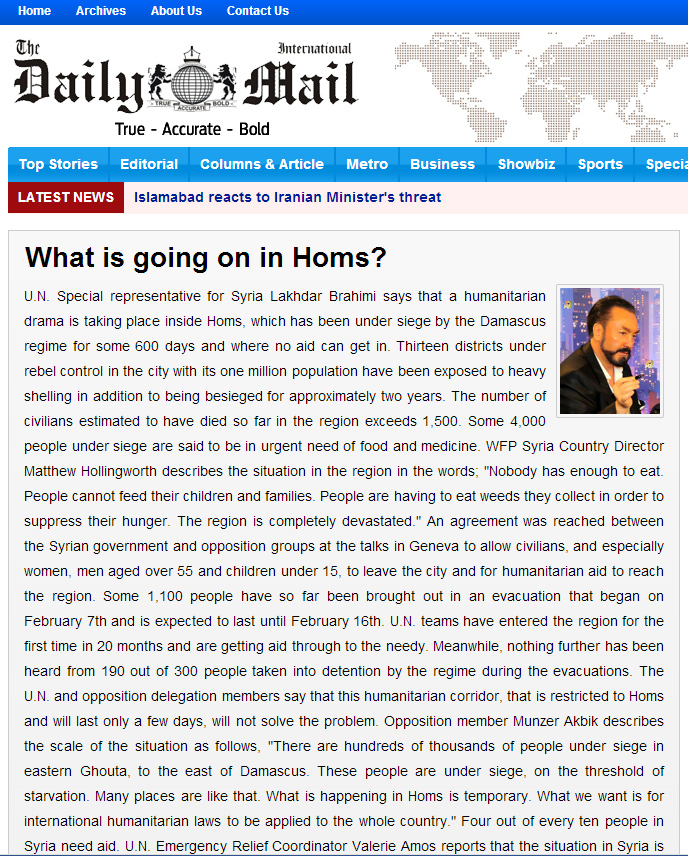
U.N. Special representative for Syria Lakhdar Brahimi says that a humanitarian drama is taking place inside Homs, which has been under siege by the Damascus regime for some 600 days and where no aid can get in.
Thirteen districts under rebel control in the city with its one million population have been exposed to heavy shelling in addition to being besieged for approximately two years. The number of civilians estimated to have died so far in the region exceeds 1,500. Some 4,000 people under siege are said to be in urgent need of food and medicine.[1] WFP Syria Country Director Matthew Hollingworth describes the situation in the region in the words; “Nobody has enough to eat. People cannot feed their children and families. People are having to eat weeds they collect in order to suppress their hunger. The region is completely devastated.”[2]
An agreement was reached between the Syrian government and opposition groups at the talks in Geneva to allow civilians, and especially women, men aged over 55 and children under 15, to leave the city and for humanitarian aid to reach the region. Some 1,100 people have so far been brought out in an evacuation that began on February 7th and is expected to last until February 16th. U.N. teams have entered the region for the first time in 20 months and are getting aid through to the needy. Meanwhile, nothing further has been heard from 190 out of 300 people taken into detention by the regime during the evacuations.
The U.N. and opposition delegation members say that this humanitarian corridor, that is restricted to Homs and will last only a few days, will not solve the problem. Opposition member Munzer Akbik describes the scale of the situation as follows; “There are hundreds of thousands of people under siege in eastern Ghouta, to the east of Damascus. These people are under siege, on the threshold of starvation. Many places are like that. What is happening in Homs is temporary. What we want is for international humanitarian laws to be applied to the whole country.”[3]
Four out of every ten people in Syria need aid. U.N. Emergency Relief Coordinator Valerie Amos reports that the situation in Syria is worsening and that the number of people requiring emergency humanitarian aid in the country has reached 9.3 million.[4] The UNHCR has issued a record $6.5 billion call for aid for Syria, but this money has not been raised.[5]
Instead of trying to stop the killings and bloodshed in Syria, countries of the world are trying to figure out whether they can even help the injured. These initiatives are inadequate and do not represent a solution to the problems. Although a proposal drafted by Australia, Jordan and Luxembourg concerning aid reaching all regions in Syria began being discussed in the U.N. General Assembly yesterday, Russia has announced it will veto it.
Thus, the U.N. or any other organization cannot solve the problems in the Islamic world.
On the other hand, the war continues to take lives in an utterly ruthless manner. The UK-based Syrian Human Rights Watch has stated that the number of civilians who died in the country during the last three weeks was greater than the figure before the Geneva II talks. The organization stated that an average 230 civilians a day are losing their lives, and that 4,959 people have died since the talks began at the end of January. The U.N. has said that the number of dead in the three-year old war, thought to exceed 136,000, will no longer be updated due to the lack of accurate data from the region.[6]
The Solution Is a Union of Islamic Countries
It is not only Syria: Terrible sufferings are going on in Islamic countries in the Middle East, Africa and Asia. In addition to deaths, a rise in unhealthy conditions and injuries, there is also a great refugee drama taking place.
Opening a humanitarian corridor, announcing brief ceasefires or trying to raise money for a system that has collapsed is not a permanent solution to all these problems. Raising money as a band-aid measure without enabling countries to become self-sufficient is not rational. For example, if we overcome hunger in an African country this month, it will just reappear next month. If we get humanitarian aid through to a district in Syria, there will be another humanitarian drama in that district tomorrow or perhaps the day after, and the suffering will spread to other districts so long as the war goes on.
The only solution to these problems is for Muslim states to set up a union similar to the model of the European Union. This union would include all 57 Islamic countries and would possess al the means necessary to urgently resolve its own internal problems. As well as building peace and tranquility in Islamic countries, this union will possess a spirit that rushes to the aid of any region in need.
Adnan Oktar's article on Daily Mail:


